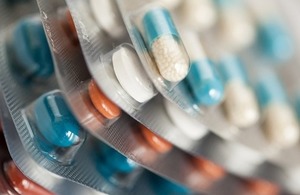UK secures historic UN Declaration on antimicrobial resistance
Landmark declaration agreeing to combat antimicrobial resistance signed by 193 countries at the United Nations General Assembly.

Packets of pills - antibiotics
The agreement follows a worldwide campaign led by the Chief Medical Officer Professor Dame Sally Davies and Health Secretary Jeremy Hunt to highlight the threat posed to modern medicine by antimicrobial resistance (AMR).
Every signatory has agreed that drug resistant infections must be tackled as a priority. The nations have committed to:
- develop surveillance and regulatory systems on the use and sales of antimicrobial medicines for humans and animals
- encourage innovative ways to develop new antibiotics, and improve rapid diagnostics
- raise awareness among health professionals and the public on how to prevent drug resistant infections
Drug-resistant infections pose the biggest threat to modern medicine. Currently, it is estimated that more than 700,000 people die annually due to drug-resistant infections such as TB, HIV and malaria but, because of the lack of global data, it is thought that the real number is likely to be far more.
By 2050, if left unchecked, drug-resistant infections will kill 10 million people a year and cost the worldwide economy $100 trillion. Chemotherapy would not be possible and even simple surgeries, such as hip operations, could be become life-threatening.
Professor Dame Sally Davies, Chief Medical Officer, said:
This Declaration is the culmination of 6 years of hard work and I am extremely proud that every UN member state is now engaged in the enormous task of tackling the greatest future threat to our civilisation.
Drug-resistant infections are firmly on the global agenda but now the real work begins. We need governments, the pharmaceutical industry, health professionals and the agricultural sector to follow through on their commitments to save modern medicine.
The UN Secretary General will now convene a group including UN agencies to accelerate action and report back in 2 years.
The Declaration builds on the important commitments made by G20 leaders earlier this month to consider how to stimulate research and the development of new antimicrobial products.
Jeremy Hunt, Secretary of State for Health said:
Antimicrobial resistance is perhaps our biggest global health threat – it could nullify the progress of over a century of modern medicine and kill millions.
So I am proud that this country has led the charge and rallied the international action necessary to tackle the problem. We are determined to build on our domestic achievements – thanks to the hard work of NHS staff, hospital acquired infections have been halved, and GPs prescribed 2.7 million fewer items this year compared to last – but we’ll couple that with global leadership as together we face up to a huge challenge.
The UK has been at the forefront of the international campaign leading up to this meeting and to mark this moment yesterday co-hosted a ministerial event with Kenya, South Africa, Australia, Argentina and Japan.
In his global review on AMR, Lord O’Neill called for a $2 billion investment in global innovation funding to tackle AMR by 2020. At the event, governments from around the world agreed to coordinate their collective AMR funding for maximum impact. Together. this funding totals more than £600 million, approaching halfway to the final ambition set by Lord O’Neill.
This includes the UK’s £369 million commitment to international AMR programmes in the last 2 years. Other commitments include £41.6 million international investment by the Joint Programming Initiative on AMR, the GARD initiative based in Geneva, significant global investment from the US through their £189 million CARBX project, and the ‘Roadmap for Antibiotic Discovery’ developed by the Pew Charitable Trusts.
The event brought together international leaders, foreign ministers, finance ministers and the pharmaceutical industry to discuss innovative ways of incentivising the development of lifesaving antimicrobials, preventive treatments such as vaccines, and better diagnostics.
Main announcements from the event include:
-
12 pharmaceutical companies have signed up to an industry ‘roadmap’ to tackle resistant infections. The roadmap contains a number of commitments including steps to ensure affordable access to high quality antibiotics in low and middle income countries.
-
to measure their progress and improve industry performance in AMR the Department for International Development has funded the creation of a new antimicrobial resistance index. This index will monitor and rank the leading pharmaceutical companies using a set of indicators that measure progress against many of the commitments made in the roadmap. The index will be created by the Access to Medicine Foundation and published in January 2018.
-
the UK’s domestic commitment to further reduce inappropriate prescriptions and the incidence of high risk bacterial infections in hospitals by 50% and cutting the level of antibiotic use in the agricultural sector to 50mg/kg by 2020.
Please help us improve our website by taking part in this short survey